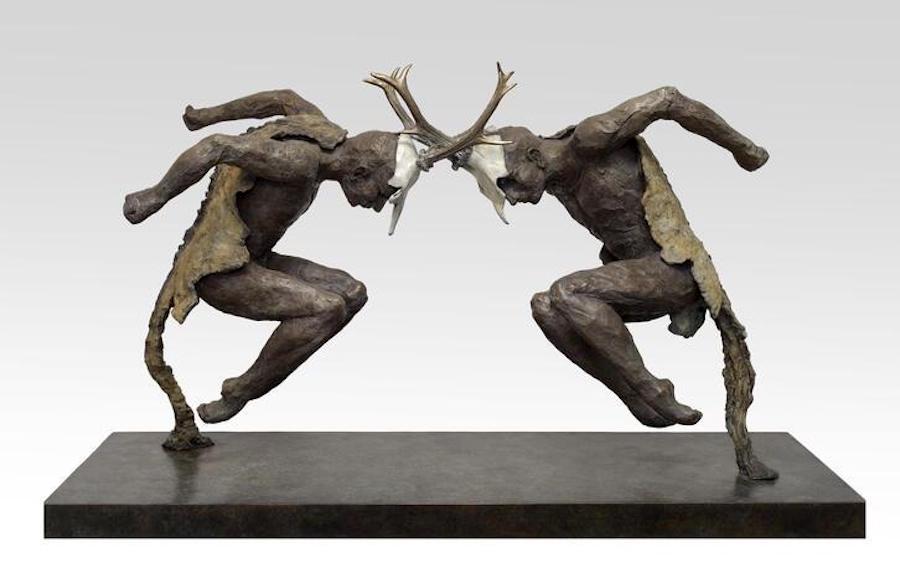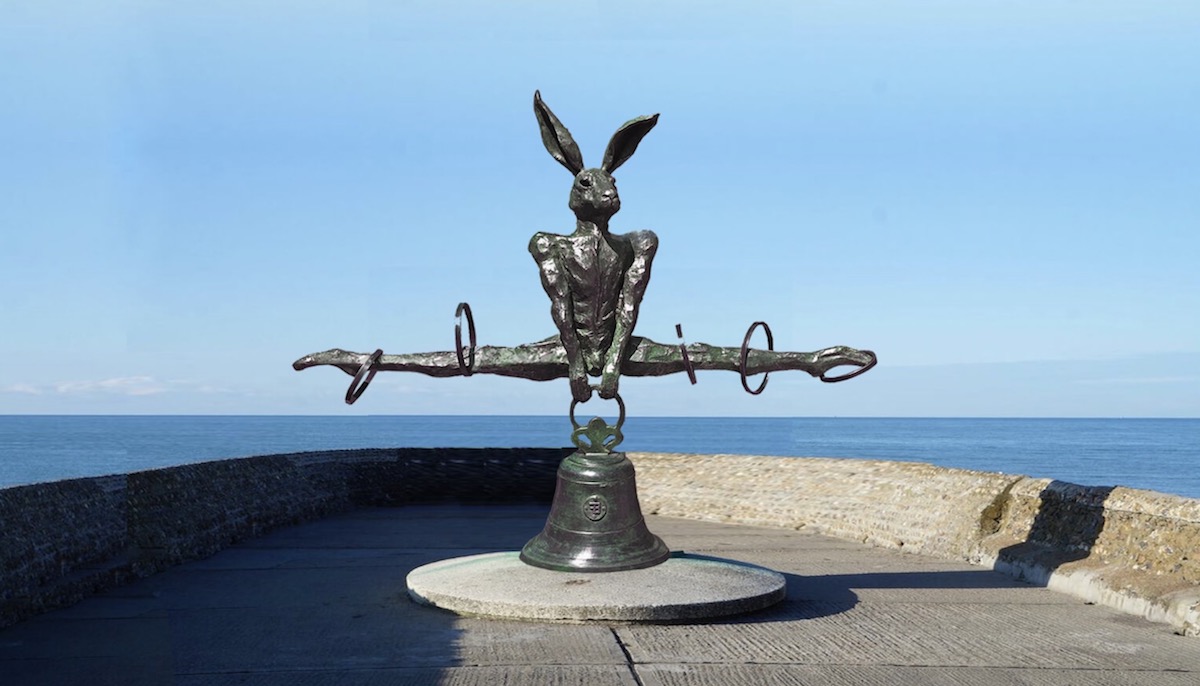During Frieze Week, the Mall Galleries on Pall Mall will host a rare joint presentation of two British artists working across generations and disciplines. INCLUSION, the debut UK solo exhibition of Mal Fostock, will occupy the West Gallery. At the same time, the North Galleries will be given over to TRANSMUTE, a new body of work by Bushra Fakhoury. Together, mother and son present more than one hundred works in print, paint, and sculpture, interwoven with collaborative projects that bridge their distinct practices.
This two-part exhibition signals a moment of visibility for both artists but also a dialogue between approaches that, though rooted in different cultural experiences, converge on shared themes of human form, myth, and the persistence of creativity across mediums.

Mal Fostock, Inclusion
For Mal Fostock, Inclusion is more than a survey: it is a declaration. Long resistant to compartmentalisation, he has chosen to display the full breadth of his practice — painting, drawing, sculpture, printmaking, and photography — side by side. The result is an exhibition that resists hierarchy, giving equal weight to media often kept separate in institutional contexts.
Educated at St Paul’s and Wimbledon College of Art, and later refined at the New York Studio School, Fostock grew up immersed in an atmosphere of artistic seriousness. Early encouragement came from prominent figures: Francesco Clemente welcomed him into his New York studio as a young artist, while Stanislav Frenkiel, Eduardo Paolozzi, and Elisabeth Frink offered both critique and affirmation. Later, the spiritual and artistic philosophy of Adi Da Samraj left a lasting mark on his outlook. More recently, training with Mike Stone in the Philippines brought a surprising resonance between martial arts and fine art, each demanding discipline and heightened awareness.
These varied influences have not produced imitation but a steady confidence in his own voice. Fostock’s figurative works — portraits, nudes, and line drawings — reveal both a fascination with physicality and a desire to capture something ungraspable. His portraits move from the intensely intimate to the stripped-back line of colour studies, but always remain alert to the mystery of individual presence. His street photography echoes this impulse: everyone, he insists, is worth looking at, everyone carries a potential picture.
For Fostock, the act of portraiture is inseparable from participation in human mystery. “While working in the quiet of the studio,” he reflects, “I enjoy the focused time delving into the qualities of whoever I’m painting. This leads to participating more fully in the utter mystery of whoever anyone is.” That insistence — that there is always more than what is visible — runs like a current throughout Inclusion.
Though Fostock has shown in the UK and US before, including collaborative exhibitions in Miami with Romero Britto, this is the first time audiences in London will see the scope of his work brought together. By situating painting alongside photography, sculpture beside drawing, the exhibition argues for a vision of practice as open and porous, where no single medium exhausts the possibilities of artistic inquiry.

Bushra Fakhoury: Transmute
While Fostock’s exhibition emphasises multiplicity, Bushra Fakhoury’s Transmute in the North Galleries draws power from transformation. The Lebanese-born British artist has spent a lifetime shaping material into form, whether bronze, resin, plaster, ceramic, or digital media. Known internationally for monumental public sculpture, she brings to the Mall Galleries a series of works that confront the environmental and social urgencies of our time.
Her latest sculptures, carved from river driftwood and plaster, turn directly to the devastation of deforestation. These works, fierce and unflinching, symbolise both nature’s endurance and its vulnerability to human greed. Here, Fakhoury’s practice extends beyond the studio: her concern for ecological destruction sits within a broader vision shaped by years of engagement with global issues, from war and displacement to solidarity and survival.
Fakhoury’s career has been one of restless movement — geographically and artistically. Born in Beirut, she spent her early years in the Ivory Coast and France, before studying in Lebanon and later completing her PhD in Art Education at the University of London. Encounters with Frenkiel, Paolozzi, and Frink reinforced her determination to pursue sculpture, while her inspirations have always ranged from Rodin to Goya and Picasso.
She first attracted international attention in 2013 with Dunamis, a nine-metre-high bronze resin and steel sculpture installed on Park Lane as part of Westminster City Council’s City of Sculpture programme. The work — an elephant held aloft by a human figure — became a landmark, embodying the precarious balance between fragility and strength, knowledge and survival. From there, further commissions followed, from Beirut to Santa Monica. Danse Gwenedour (2017), inspired by a traditional Breton dance, emphasised solidarity over individual display, with masked, naked figures linked in communal motion.
Fakhoury’s Transmute draws on this history but strikes an even sharper note. Where Dunamis symbolised the potential of human aspiration, the new works warn of the consequences of unchecked exploitation. Yet even in their anger, they retain an unmistakable play of form, a sculptural vitality that points to the possibility of renewal.
Collaboration Across Generations
Though their exhibitions are distinct, the show also highlights the ongoing collaboration between Fakhoury and Fostock. Photographic projects, sculptures, and joint works punctuate the exhibition, evidence of an extended dialogue between mother and son.
For Fostock, photographing his mother’s objects — both the sculpted and the found — was a way of extending their lives, allowing them to exist in a new visual register. For Fakhoury, the exchange has been equally vital: “When we work together, even though our approaches are entirely different, it gels together as if it were one soul.”
The familial element is not incidental. Both artists emphasise that their creativity is grounded in shared imagination, mutual trust, and a willingness to let the process unfold. Suppose Fakhoury likens herself to a kite and her son to the string that grounds her. In that case, their joint exhibition makes visible that interdependence, offering audiences not just two separate careers but a generational continuum.
Mall Galleries During Frieze Week
Timed to coincide with Frieze Week, Inclusion and Transmute add a distinctive note to London’s busiest art season. At a moment when the capital’s galleries and institutions are filled with international arrivals, this exhibition turns attention to a dialogue rooted in London but reaching far beyond — from Beirut to New York, from Africa to Europe.
Across more than one hundred works, Fostock and Fakhoury demonstrate that practice, when pursued with persistence and openness, resists easy classification. Their joint presence at Mall Galleries is not just a chance to see new work but an invitation to consider how art evolves across generations, cultures, and disciplines.
INCLUSION: Mal Fostock & TRANSMUTE: Bushra Fakhoury Mall Galleries, London 7–11 October 2025

